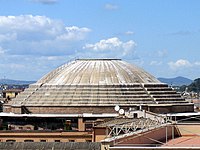
Photo from wikipedia
Abstract This paper presents the results of the investigation on the applicability of shungite as an electrically conductive additive in cement composites. In this study, shungite-3 containing: 34.3 wt% of carbon,… Click to show full abstract
Abstract This paper presents the results of the investigation on the applicability of shungite as an electrically conductive additive in cement composites. In this study, shungite-3 containing: 34.3 wt% of carbon, 56.3 wt% of SiO2, 3.8 wt% of Al2O3 and porosity of 11 wt% was used. Cement mortars with a different shungite content were prepared and their electrical, piezoresistive, thermoelectric and mechanical properties were characterized. The electrical properties were evaluated by means of DC measurements and impedance spectroscopy (IS). Changes in the resistivity of the composites with a different shungite addition under compressive loading were measured to determine their piezoresistive properties. Thermoelectric properties were established through the evaluation of Seebeck effect. The pozzolanic activity of the shungite was also examined. The results of the research revealed that shungite is a promising conductive additive for cement composites. Introduction of at least 16 vol% of shungite allows to obtain composites with electrical properties, enabling their application in stress/damage or temperature monitoring. The resistivity values of the composites with shungite are in the range of 0.1–25 kΩ cm. These composites exhibit good synchronization and repeatability of the changes in resistivity with compressive stress. The value of stress sensitivity and gauge factor is in the range of 0.12–0.41%/MPa and 21–29, respectively. Cement composites with shungite also show thermoelectric effect, with the values of the Seebeck coefficient in the range of 3.4–4.1 μV/K. Despite the poor pozzolanic activity of shungite, mechanical properties of the composites are sufficient for multifunctional applications.
Journal Title: Journal of Building Engineering
Year Published: 2022
Link to full text (if available)
Share on Social Media: Sign Up to like & get
recommendations!